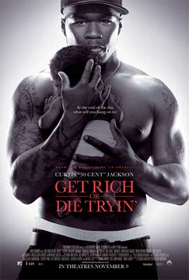Jim Sheridan - Get Rich or Die Tryin' Interview

by Paul Fischer in Los Angeles
In this exclusive interview, Sheridan explained to Paul Fischer why he chose this quintessentially American film as his next project.
Paul Fischer: It does seem like a rather odd combo you and Fifty Cent. I mean were you quite kind of surprised that you became involved in this project?
Jim Sheridan: Yeah a little bit. It came about because Bono brought me to a part at Jimmy Ivy?s house and Jimmy asked me to do the movie. I had been tied into doing a lot of American films in the last 10 years and I just heard the story of Fifty Cent and said okay I?ll do it.
Paul Fischer: Why?
Jim Sheridan: Cause I knew I couldn?t change the end: he?d be shot and he?d come back and would be a star. So therefore I knew, when there is something I have to stick with, some reality. It reminded me of a play I did when I was younger about a guy who was an arsonist who burnt buildings. it turned out he didn?t, was innocent and we did a play about him going to jail. So it was the same kind of world I grew up in, that of Poverty and drugs.
Paul Fischer: Can you describe your first meeting with 50 Cent?
Jim Sheridan: He came to a hotel in New York, and we talked and got on well. I read with him, his manager was there and we just read some of the script together. At the end of it I said to him: look if I make this movie I am confident that you will be good an actor in it so if it doesn?t turn out right it will be my fault. I knew from his videos, his presence and from meeting him he could act sufficiently well to do it,
Paul Fischer: What did you do to be able to coax a performance out of him?
Jim Sheridan: Well first of all I don?t like the idea of all the acting coaches, so I don?t really try to get people to perform. I just try to protect them and give them the room to develop rather than you have to be this, and meet this expectation. I just try to take all that away, to take the fear out of the situation and just give emotional support. If a 6 year old kid can act we shouldn?t be surprised that an adult can act except the adult has lost the magic of childhood imagination. So you just take away all the fear and let people be themselves and from the first 7 seconds you know whether somebody can act.
Paul Fischer: So were you confident that once you starting working with him on the set that he was going to deliver the goods?
Jim Sheridan: The first shooting day was difficult because everybody is always nervous and he was shifting from foot to foot so I spent the first few days shooting him like 8 hours, 9 hours a day just trying to squash everything into the first couple of days of what the basics of acting are like stand still, keep your eyes still, speak slowly and clearly. In those 2 days he never lost his temper and he never emotionally went to a place of feeling foolish. He has great self confidence and great charisma so I knew we were okay.
Paul Fischer: Do you think that being an outsider gives you a different perspective on the world that you are creating in this movie?
Jim Sheridan: Yeah. In Ireland we have a thing called begrudges , which are people who begrudge success and the reason for it is people who were successful in Ireland crossed two lines - a Class Line and a Racial Line and that is kind of true in American Black culture, in that a lot of the people that become successful had sold out. So there is a lot of bitterness and anger in the community against that kind of success. I kind of come from a culture of where they understand that but I didn?t approach it like oh god I am making a Black movie and I should be scared if I can I get it right. I just start making a movie maybe I will even make a White movie with Black actors and no fear of will I get it right really just, kind of empathy with the culture.
Paul Fischer: There is no doubt that the Black audience will flock to see this but how difficult is it to make a film like this and cater for an audience outside of that urban market do you think.
Jim Sheridan: I think it is difficult and I think a lot of the difficulties is within the studio system set up, It is like Black films don?t cross over but Black music does. The reason Black music crosses over is that there is no big studios involved and no big cost in making a CD, so it doesn?t cost huge amounts and therefore there is no fear, so there are people telling the truth. Thus there is a bit of poetry, a bit of truth and a bit of life in it, whereas the movies are trying to predigest, pre plan, pre cook and beat them into the ground with over worry, over notes and over intellect.
Paul Fischer: Do you see universality in this film and if so what is that universality?
Jim Sheridan: I think it's kind of like a fella searching for something spiritual, searching for his father, searching for meaning, finding protection with women, finding that you have to develop himself and not look outside himself and I think that there is so relevant to every audience. I am used to making films outside of a culture. lf you imagine the number of Irish or Australian, English films that worked in America you can count them on one hand., so I kind of know how difficult it is for a minority culture to penetrate into the mainstream of America and if you don?t do that your film doesn?t exist.
Paul Fischer: Is it important for you to have a personal affinity with the material that you are working with? I mean you?ve made so many personal films about the Irish experience.
Jim Sheridan: Yeah, but I felt...I just became personal with this. To me Fifty was just my brother who had come back from the dead. He was like somebody who I could protect.
Paul Fischer: Now, it seems to me that there are a number of films that have been aligned with so what actually are you working on next?
Jim Sheridan: I am working on a film about an assassination of a senator called Sins of The Father and I have written a story about growing up in Dublin called Sheriffs Dream.
Paul Fischer: So all these other things like Da Vinci?s Mother and Emerald City and all those things...
Jim Sheridan: Well Emerald City I was working with Lukas Reiter on it, Da Vinci?s Mother was just mentioned once in Fox, as I read it, I liked the script I don?t think I will do it. What else?
Paul Fischer: The Untitled Jim Sheridan Ikiru Project?
Jim Sheridan: Yeah, I was working on that with DreamWorks.
Paul Fischer: So your next film immediately is going to be which of those two?
Jim Sheridan: I don?t know, I honestly don?t know, which ever gets to the line first.
Paul Fischer: is it important for you to go back to Ireland and tell another Irish story?
Jim Sheridan: No, not really. No I can do whatever it doesn?t really matter where it is set.
Paul Fischer: is this kind of the most creatively interesting period of your career?
Jim Sheridan: Yeah maybe. It is good and exciting to go outside your own little society and do something different.
IRISH DIRECTOR?S PERSPECTIVE OF BLACK AMERICA.
Irish director Jim Sheridan, who won plaudits for his lyrical tale of Irish immigration on his In America, has made a film that is vastly distinctive from all that has come before it. Sheridan?s take on urban America, Get Rich or Die Tryin', is the loosely autobiographical tale of an orphaned street kid (Curtis "50 Cent" Jackson), who initially makes his mark in the drug trade, but finally dares to leave the violence of his former life behind to pursue a promising career in the music business as a rapper.In this exclusive interview, Sheridan explained to Paul Fischer why he chose this quintessentially American film as his next project.
Paul Fischer: It does seem like a rather odd combo you and Fifty Cent. I mean were you quite kind of surprised that you became involved in this project?
Jim Sheridan: Yeah a little bit. It came about because Bono brought me to a part at Jimmy Ivy?s house and Jimmy asked me to do the movie. I had been tied into doing a lot of American films in the last 10 years and I just heard the story of Fifty Cent and said okay I?ll do it.
Paul Fischer: Why?
Jim Sheridan: Cause I knew I couldn?t change the end: he?d be shot and he?d come back and would be a star. So therefore I knew, when there is something I have to stick with, some reality. It reminded me of a play I did when I was younger about a guy who was an arsonist who burnt buildings. it turned out he didn?t, was innocent and we did a play about him going to jail. So it was the same kind of world I grew up in, that of Poverty and drugs.
Paul Fischer: Can you describe your first meeting with 50 Cent?
Jim Sheridan: He came to a hotel in New York, and we talked and got on well. I read with him, his manager was there and we just read some of the script together. At the end of it I said to him: look if I make this movie I am confident that you will be good an actor in it so if it doesn?t turn out right it will be my fault. I knew from his videos, his presence and from meeting him he could act sufficiently well to do it,
Paul Fischer: What did you do to be able to coax a performance out of him?
Jim Sheridan: Well first of all I don?t like the idea of all the acting coaches, so I don?t really try to get people to perform. I just try to protect them and give them the room to develop rather than you have to be this, and meet this expectation. I just try to take all that away, to take the fear out of the situation and just give emotional support. If a 6 year old kid can act we shouldn?t be surprised that an adult can act except the adult has lost the magic of childhood imagination. So you just take away all the fear and let people be themselves and from the first 7 seconds you know whether somebody can act.
Paul Fischer: So were you confident that once you starting working with him on the set that he was going to deliver the goods?
Jim Sheridan: The first shooting day was difficult because everybody is always nervous and he was shifting from foot to foot so I spent the first few days shooting him like 8 hours, 9 hours a day just trying to squash everything into the first couple of days of what the basics of acting are like stand still, keep your eyes still, speak slowly and clearly. In those 2 days he never lost his temper and he never emotionally went to a place of feeling foolish. He has great self confidence and great charisma so I knew we were okay.
Paul Fischer: Do you think that being an outsider gives you a different perspective on the world that you are creating in this movie?
Jim Sheridan: Yeah. In Ireland we have a thing called begrudges , which are people who begrudge success and the reason for it is people who were successful in Ireland crossed two lines - a Class Line and a Racial Line and that is kind of true in American Black culture, in that a lot of the people that become successful had sold out. So there is a lot of bitterness and anger in the community against that kind of success. I kind of come from a culture of where they understand that but I didn?t approach it like oh god I am making a Black movie and I should be scared if I can I get it right. I just start making a movie maybe I will even make a White movie with Black actors and no fear of will I get it right really just, kind of empathy with the culture.
Paul Fischer: There is no doubt that the Black audience will flock to see this but how difficult is it to make a film like this and cater for an audience outside of that urban market do you think.
Jim Sheridan: I think it is difficult and I think a lot of the difficulties is within the studio system set up, It is like Black films don?t cross over but Black music does. The reason Black music crosses over is that there is no big studios involved and no big cost in making a CD, so it doesn?t cost huge amounts and therefore there is no fear, so there are people telling the truth. Thus there is a bit of poetry, a bit of truth and a bit of life in it, whereas the movies are trying to predigest, pre plan, pre cook and beat them into the ground with over worry, over notes and over intellect.
Paul Fischer: Do you see universality in this film and if so what is that universality?
Jim Sheridan: I think it's kind of like a fella searching for something spiritual, searching for his father, searching for meaning, finding protection with women, finding that you have to develop himself and not look outside himself and I think that there is so relevant to every audience. I am used to making films outside of a culture. lf you imagine the number of Irish or Australian, English films that worked in America you can count them on one hand., so I kind of know how difficult it is for a minority culture to penetrate into the mainstream of America and if you don?t do that your film doesn?t exist.
Paul Fischer: Is it important for you to have a personal affinity with the material that you are working with? I mean you?ve made so many personal films about the Irish experience.
Jim Sheridan: Yeah, but I felt...I just became personal with this. To me Fifty was just my brother who had come back from the dead. He was like somebody who I could protect.
Paul Fischer: Now, it seems to me that there are a number of films that have been aligned with so what actually are you working on next?
Jim Sheridan: I am working on a film about an assassination of a senator called Sins of The Father and I have written a story about growing up in Dublin called Sheriffs Dream.
Paul Fischer: So all these other things like Da Vinci?s Mother and Emerald City and all those things...
Jim Sheridan: Well Emerald City I was working with Lukas Reiter on it, Da Vinci?s Mother was just mentioned once in Fox, as I read it, I liked the script I don?t think I will do it. What else?
Paul Fischer: The Untitled Jim Sheridan Ikiru Project?
Jim Sheridan: Yeah, I was working on that with DreamWorks.
Paul Fischer: So your next film immediately is going to be which of those two?
Jim Sheridan: I don?t know, I honestly don?t know, which ever gets to the line first.
Paul Fischer: is it important for you to go back to Ireland and tell another Irish story?
Jim Sheridan: No, not really. No I can do whatever it doesn?t really matter where it is set.
Paul Fischer: is this kind of the most creatively interesting period of your career?
Jim Sheridan: Yeah maybe. It is good and exciting to go outside your own little society and do something different.
MORE
Copyright © 2001 - Girl.com.au, a Trillion.com Company - All rights reserved. 6-8 East Concourse, Beaumaris, Vic 3193, Australia.





